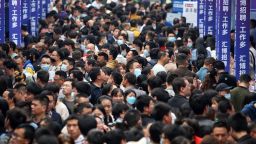Until a few weeks ago, Chinese shares were among the best-performing in the world over the previous six months as investors bet on the country’s economic recovery after the lifting of pandemic restrictions.
But since April 18, when China released figures on its first-quarter economic output, stocks of Chinese companies around the world have lost about $540 billion in value, according to CNN calculations. Investors trimmed their exposure to China amid economic uncertainty in the country, rising geopolitical tensions and Beijing’s crackdown on international consulting firms.
The Nasdaq Golden Dragon China Index has lost more than 5% since April 18. Hong Kong’s Hang Seng (HSI) Index has also shed 5%. And the Shanghai Composite Index and the Shenzhen Component Index have fallen 3% and 6.5% respectively. During the same period, the Nasdaq Composite jumped 4%.
The selling is not limited to equities. The Chinese yuan, a barometer of investor sentiment, has tumbled over 2% in the past month. On Wednesday, the yuan sank below 7 to the US dollar in offshore trading, breached that key level for the first time this year. The currency weakened further on Friday, hitting its lowest level in nearly six months.

“Investors remain skeptical [about China] for two primary reasons. First, the recovery has not been robust,” said Brock Silvers, chief investment officer for Hong Kong-based Kaiyuan Capital.
Another concern for global investors is the country’s “fundamental investability,” he said, referring to geopolitical and Chinese policy risks.
Relations between the United States and China have become increasingly tense over the past few months. Washington has ramped up sanctions against key Chinese industries, including chipmaking. Beijing has displayed a growing distrust of foreign companies, cracking down on international consultancies and expanding the country’s counter-espionage law last month.
“Unfortunately after two decades of mutual benefit, global tensions have risen between China and the US,” said Michael Kelly, global head of multi-asset at PineBridge Investments, a New York-based asset management firm.
Patchy recovery
Chinese stocks began a sharp rally in late October on hopes that the country would exit its costly zero-Covid policy. In early December, Beijing ditched the stringent restrictions, which resulted in a quick rebound in economic activity.
But despite solid consumption-led growth of 4.5% in the first quarter, recent economic data point to an uneven recovery in the world’s second largest economy.
On Tuesday, China released a batch of economic data for April, which largely disappointed investors. Nomura and Barclay lowered their forecasts to 5.5% and 5.3%, respectively, after the data release. But UBS and Goldman Sachs maintained their growth projections, which are 5.7% and 6% for the year.
The consumer price index rose by just 0.1% in April, the slowest pace in more than two years. The producer price index, which measures factory-gate prices, declined by 3.6%, marking the biggest contraction in three years, and underscoring the risk of deflation.
Imports plunged 7.9% in April, reinforcing signs of feeble domestic demand. As for employment, the jobless rate for 16- to 24-year-olds hit a record high of 20.4% in April.
China’s “faltering” real estate sector, formerly the economy’s main driver, remains a major worry, said Silvers. Over the past few decades, the sector has accounted for as much as 30% of China’s GDP.
On Wednesday, the National Bureau of Statistics reported that new home prices rose by just 0.3% in April, after 0.4% in March, suggesting that the pent-up demand may be fading after the end of pandemic restrictions. Before February, home prices had been in a historical decline for about 18 months.
Anti-spy crackdown
Even as leaders have sought to woo back foreign investment, a campaign against consulting and due diligence firms has unnerved business people.
Last month, Beijing updated its counter-espionage law, which expanded the list of activities that could be considered spying. Over the past few months, officials have launched a series of raids on consultancies, including Capvision, Bain & Company and Mintz Group.
They accused Capvision, which is based in Shanghai and New York, of helping to leak sensitive military information to foreign forces. The authorities have also announced a nationwide investigation into whether the consultancy industry has been used for espionage.
“Beijing’s moves to reduce foreign access to domestic information and business intelligence make equity investment in China more challenging,” said Neil Thomas, a fellow at the Asia Society Policy Institute’s Center for China Analysis.
“The enhanced focus on national security in economic policymaking is a typical example of how Xi’s leadership is creating political risks that are making it harder for foreign firms to do business in China.”
Fund managers and analysts say the crackdown makes it much tougher for foreign investor to get routine information about Chinese companies that would normally factor into their decision making.
At the same time, Beijing has restricted overseas access to some Chinese data sources, such as Wind, a database that provides key financial data.
Closing shop
Some funds and research firms are shutting up shop.
Forrester Research, a US tech-focused research and advisory firm, plans to cut the majority of its China analysts, according to media reports. In a response to CNN, Forrester said that it was shutting its China office as part of a global restructuring.
“The unsteady economy, along with our ongoing product transformation, are the key drivers for the change,” a spokesperson said. The size of the company’s China business is “not material” in relation to its global revenue and it would service its clients in China through its global research team, the spokesperson said.
Ontario Teachers’ Pension Plan, one of the world’s largest pension funds, has closed its Hong Kong-based China equity investment team.
“We will no longer have country-focused stock-picking teams based in Asia, resulting in the departure of five of our colleagues in our Hong Kong office,” said Dan Madge, a spokesperson for the pension fund, in a statement to CNN.
Some investors, however, are convinced Chinese will bounce back.
“While there is no doubt that a large correction has taken place in China’s stock market … one also needs to keep in mind that this follows China previously leading most major stock markets off the October lows,” said Kelly at PineBridge Investments.
“The more cracks appear in Western economies,” the more global investors will need to put money into Chinese assets, he added.









